Oh how happy are the newlyweds, Sitting together joking and laughing.
Syalala syalala.
This excerpt from the song "Newlyweds" has become a mandatory song at wedding celebrations. Besides being entertainment for guests, this song also makes us think about extreme questions like: does marriage really make people happy?
It turns out that Statistics Indonesia (BPS) has previously answered this question through a national-level survey, the Happiness Measurement Survey (SPTK) in 2017. This survey was conducted in 34 provinces and 487 regencies/cities in Indonesia from April 5-30 with 75,000 household samples. In each household, the head of household and spouse of the head of household were selected as respondents to represent that household.
In general, happiness measured by BPS describes subjective well-being, which is a person's assessment of themselves regarding whether they are prosperous or not. This is certainly different from "objective" welfare indicators that are often measured, such as looking at a person's income or economic status.
This article will present statistical data obtained from the Indonesian Happiness Index 2017 publication. The happiness index derives from 3 main aspects: life satisfaction dimension, feeling dimension, and meaning of life dimension.
Fact 1: Married people are not as happy as single people, but happier than divorced and widowed people
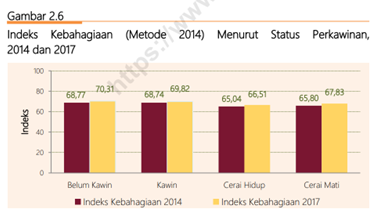
The bar chart shows that married residents have lower happiness than single residents. This data simultaneously answers the question "Does getting married make life happier?". Based on statistical data, the answer is no.
Additionally, from the bar chart it's also known that residents with divorced status, whether divorced or widowed, have happiness levels below married and single residents. Yes, we all know that being left by a loved one is a source of sorrow rather than happiness.
So which is more "ambyar" (less happy) between being left due to incompatibility (divorced) and being left by a spouse's death (widowed)? It turns out, most Indonesians are more ambyar when divorced. I personally think this happens because divorce is harder to move on from since the person is still alive, thus causing unhappiness.
Fact 2: Spouses are happier than heads of household
The head of household as defined by BPS doesn't necessarily mean male or always male, although this population is mostly male. The head of household is someone from a group of household members who is responsible for the daily needs of that household or a person who is considered/appointed as the head in that household (BPS, 2017).
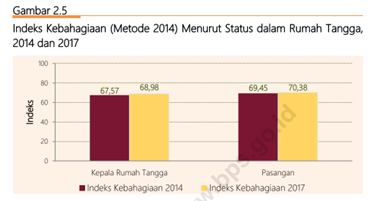
In the bar chart, it's known that both in 2014 and 2017, spouses of household heads have higher happiness levels than household heads. This is possibly because the role of household head (usually husband) as the person responsible for the household is heavier than their spouse's (usually wife).
Fact 3: The more household members, the happier
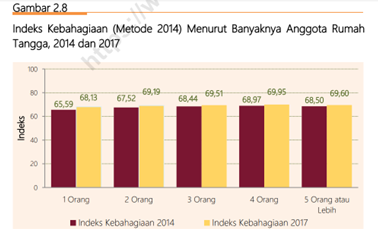
"Many children, much fortune" might be an appropriate saying to describe this bar chart. Humans are essentially social beings. So, when there are more people in their household, the happiness level will be higher.
Fact 4: The higher the household income, the happier
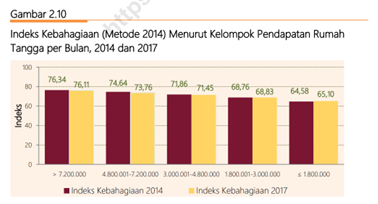
Again, economic factors have a significant role in welfare levels even when measured subjectively in the form of happiness levels. The bar chart shows that the lower the monthly household income, the unhappier the respondents in that household will be. Now, do you understand what the key to happiness is and the motivation to achieve happiness? Money!
Fact 5: Working household heads are happier than unemployed household heads. However, unemployed spouses are happier than working spouses
This section is very unique to interpret. The bar chart shows high happiness levels in working household heads (usually husbands), but working spouses (usually wives) have low happiness. The bar chart also shows very significant disparity between household heads and spouses.
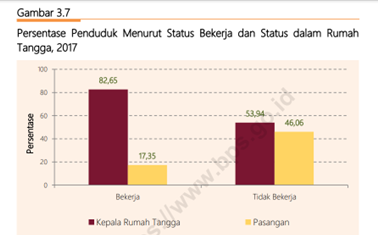
What happens in the second part of the chart (not working), spouses actually appear happier when not working compared to working. Conversely, unemployed household heads appear less happy compared to working household heads.
The data presented above can be accessed for free in BPS Publication: Happiness Index 2017. Final message from the author: don't forget to be grateful and happy so that Indonesia's Happiness Index rises!